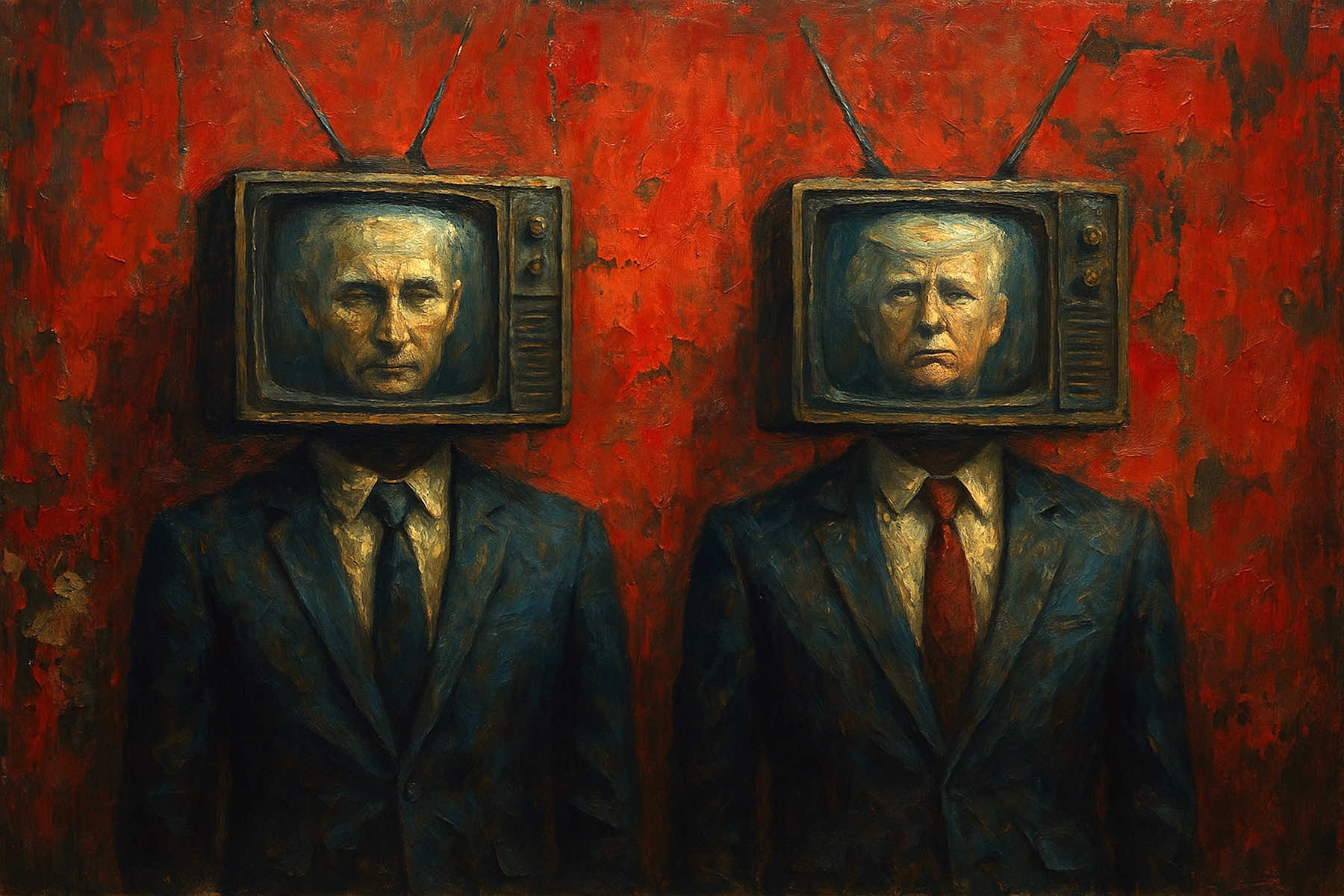
As Russia wages its brutal and unprovoked war on Ukraine, a troubling alignment has emerged not only among those inside Russia’s media sphere, but also among some Ukrainian Americans and conservative U.S. TV viewers who repeat narratives that mirror Kremlin disinformation.
Analysts say the effects of long-term propaganda, whether through Soviet indoctrination or right-wing American partisan media, have created overlapping patterns of denial, distortion, and loyalty that now threaten democratic outcomes across borders.
Among certain older Ukrainians, especially those who came of age during the Soviet Union, Russia is still viewed as a cultural sibling, not an imperial aggressor. This view is rooted in decades of Soviet messaging that framed Moscow as the protector of Slavic unity and the West as a corrupt external threat.
A 2023 study by the Ukrainian polling firm found that while national support for resisting Russian aggression has increased since 2022, a persistent minority in some eastern regions and older age brackets still expressed hesitation about NATO membership or viewed the war as a civil conflict, a framing widely used in Russian propaganda.
“Russian disinformation works because it doesn’t have to win over everyone,” said Peter Pomerantsev, a senior fellow at the SNF Agora Institute at Johns Hopkins University and expert on authoritarian media. “It just has to confuse, divide, and demoralize. That strategy has been adapted and exported to democracies, including the U.S.”
FROM SOVIET CONTROL TO DIASPORA DISTORTION
The long-term effect of Soviet information control continues to influence how some Ukrainians, especially emigrants who left before 1991, perceive modern events. State education in the USSR presented Ukraine as a regional dependency rather than an autonomous nation, and Russia as the architect of peace and civilization.
These false narratives persisted even in diaspora circles, through Russian-language media, Orthodox church networks, and community organizations that continued consuming Kremlin-aligned news sources.
A 2019 report from the Wilson Center noted that pro-Kremlin media often tailors content for the Russian-speaking diaspora in North America, including Ukrainian Americans, with themes emphasizing nostalgia for Soviet stability, skepticism of Western liberalism, and conspiracy theories about NATO expansion.
These narratives are now clashing with the brutal reality on the ground in Ukraine, where Russian forces have killed civilians, leveled cities, and committed atrocities documented by international observers, including Wisconin’s only news team to report about the war from the frontlines, Milwaukee Independent.
Yet even amid this devastation, some voices in the West, both Ukrainian and American, continue to frame Ukraine as corrupt or complicit in provoking war, echoing Kremlin lines designed to undermine international support for Kyiv.
FOX NEWS AND THE AMERICAN PROPAGANDA PIPELINE
In the United States, the spread of similar narratives has occurred not by foreign media but through domestic partisan channels, with Fox “News” playing a central role. The network has amplified anti-Ukraine sentiment, cast doubt on U.S. intelligence, and pushed conspiracy theories about Ukrainian interference in U.S. elections, claims debunked by the FBI and Senate Intelligence Committee.
Media Matters for America, a watchdog group, documented that from 2019 through 2022, Fox News frequently aired segments questioning Ukraine’s legitimacy, attacking President Volodymyr Zelenskyy, and defending Trump’s attempt to pressure him into opening an investigation into Joe Biden — a move that led to Trump’s first impeachment.
Tucker Carlson, who was until 2023 one of the network’s highest-rated hosts, regularly questioned U.S. aid to Ukraine and made it his mission to justify Russia’s actions.
In a February 2022 broadcast, just before the invasion, Carlson said “Has Putin ever called me a racist? Has he threatened to get me fired for disagreeing with him? Has he shipped every middle-class job in my town to Russia? Did he manufacture a worldwide pandemic that wrecked my business and kept me indoors for two years? Is he teaching my children to embrace racial discrimination? Is he making fentanyl? Is he trying to snuff out Christianity?”
Just over 24 hours later, Putin declared war on Ukraine with a surprise full-scale invasion.
In February 2024, speaking at the World Government Summit in Dubai, Carlson remarked: “Every leader kills people, some kill more than others. Leadership requires killing people.” In a March 2025 interview with Chris Cuomo, Tucker Carlson stated: “I am definitely more sympathetic to Putin than Zelensky for the following reason: I think it’s fair to judge leaders on how they do for their country. They have one job. Do a good job for your country. Make it better.”
Clips from his Fox show were so consistent with Kremlin messaging in 2022 that it was replayed on Russian state television, according to reporting from “Mother Jones” and the “New York Times.”
“Fox News serves a function not unlike state TV in autocracies, not because it’s government-run, but because it protects a political faction from reality,” said Anne Applebaum, author of “Twilight of Democracy,” in a 2023 panel at the Hoover Institution. “Its purpose isn’t to inform. It’s to reinforce a worldview where facts are subordinate to loyalty.”
PARALLEL TACTICS OF DISTORTION AND ALLEGIANCE
While the methods differ, experts argue that Russian and American right-wing propaganda share core strategies: fostering identity-based loyalty, sowing mistrust in independent institutions, and reframing accountability as political persecution.
This helps explain why many Trump supporters continue to defend actions ranging from his 2019 Ukraine phone call to the January 6 Capitol attack. When political loyalty becomes a substitute for civic trust, the legal system, journalism, and democratic norms all become targets.
“When a population is primed to distrust everything outside their bubble, truth becomes irrelevant,” said Ruth Ben-Ghiat, professor of history at NYU and author of “Strongmen: Mussolini to the Present.” “That’s the common denominator in both systems, Soviet-style propaganda, and American hyper-partisan media.”
The consequences are profound. In Ukraine, Russia’s false narratives have been used to justify a full-scale invasion and ethnic cleansing campaigns in occupied regions. In the U.S., similar tactics have led to declining support for Ukraine aid among Republican voters and rising distrust in American elections and institutions.
According to a December 2023 Pew Research poll, only 31% of Republicans supported continued U.S. funding for Ukraine, down from 68% in early 2022. The drop coincides with years of anti-Ukraine coverage from Fox News, social media influencers aligned with the MAGA movement, and political figures like Trump and Representative Marjorie Taylor Greene, who have questioned the legitimacy of Ukraine’s government.
UNDERMINING UKRAINE, EMPOWERING AUTOCRACY
The erosion of support for Ukraine among Trump-aligned Americans is not simply a matter of foreign policy fatigue, it is a byproduct of domestic polarization weaponized by propaganda. Trump himself has repeatedly praised authoritarian leaders, including Russian dictator Vladimir Putin, calling him “smart” and “savvy” in February 2022 as Russian troops prepared to invade Ukraine.
Despite bipartisan congressional support for aid to Ukraine in the early months of the war, Trump-aligned MAGA Republicans pushed to curtail or cancel funding packages. In October 2023, Representative Marjorie Taylor Greene introduced an amendment to strip Ukraine funding from a defense spending bill, arguing, “We are not the world’s piggy bank.” She has also called Ukraine’s government “corrupt” and accused it of laundering U.S. taxpayer money, echoing unsubstantiated and false claims promoted on right-wing media.
These narratives mirror Russian disinformation themes. The Kremlin has long attempted to frame Ukraine as a failed state run by oligarchs or Nazis—rhetoric used to justify its invasion. By repeating these ideas, American political actors are not just undermining a U.S. ally, but validating the logic of autocratic aggression.
“Any time a democracy turns against its own institutions or allies based on partisan propaganda, it hands a victory to authoritarian regimes,” said Timothy Snyder, a historian at Yale University and author of “The Road to Unfreedom,” in a lecture at the Royal Institute of International Affairs. “The damage isn’t limited to public opinion, it’s geopolitical.”
WEAPONIZED LOYALTY AND THE COLLAPSE OF ACCOUNTABILITY
What connects Trump-aligned messaging and Putinist propaganda is not ideology but the centrality of loyalty. In both systems, political allegiance supersedes facts, and any dissent is cast as betrayal.
This has allowed supporters to justify Trump’s actions, whether his attempt to overturn the 2020 election by staging a coup, his pressure campaign against Zelenskyy in 2019 to attack his political rival Joe Biden, or his mishandling of classified documents — while simultaneously portraying any legal accountability as persecution by a “deep state.”
Trump has repeatedly accused prosecutors, judges, and journalists of being enemies of the people, language that mirrors authoritarian talking points from Hungary to Russia.
This approach is not accidental. It is a deliberate strategy to delegitimize oversight and concentrate power. In the process, disinformation is not just a tactic. It becomes infrastructure, a permanent feature of political life. That is the hallmark of what scholars like Snyder and Applebaum have described as “managed democracy,” where elections exist but are undermined by relentless distortion.
CONSEQUENCES BEYOND BORDERS
The implications for global security are dire. When American support for Ukraine fractures, it emboldens not only Putin but other authoritarian leaders watching the U.S. for signs of weakness. It also undermines NATO cohesion and casts doubt on America’s willingness to defend democratic values abroad.
Meanwhile, inside Ukraine, the consequences are not theoretical. As U.S. political support wavers, Ukraine faces material shortages on the battlefield and delays in critical aid packages. Russia has exploited these moments to escalate missile attacks on residential centers and push offensives to seize territory in Donetsk and Zaporizhzhia.
Zelenskyy has made repeated appeals to the U.S. public and Congress, warning that wavering support could lead to a broader war across Europe. “If Ukraine falls, what will happen in ten years? Just think about it,” he said in an interview with NBC News in December 2023. “If the Russians reach Poland, what’s next?”
That warning goes beyond territorial concerns. The rise of disinformation-fueled movements, whether in Moscow or from Fox studios in New York, threatens to collapse the shared understanding necessary for democracy to function. When political identity becomes a filter for truth, propaganda is no longer foreign. It becomes domestic policy.
Experts argue that reversing this trend will require confronting disinformation directly, investing in independent journalism, and restoring public trust in democratic systems. But the first step is acknowledging that the line between external propaganda and internal manipulation has all but vanished.
“The tragedy is that Americans are being turned against their own principles using tactics that once belonged to our adversaries,” said Snyder. “If we want to defend democracy abroad, we have to defend truth at home.”
© Image
ChatGPT/Dall-E














